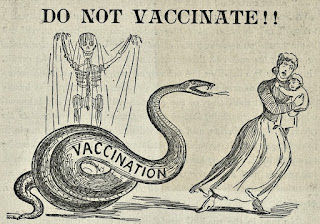 |
| Source: The Atlantic |
Anti-vaccination attitudes are highest in conspiratorial thinkers. Tightly held beliefs will commonly trump empiricism so an evidence based argument will do little to sway anti-vaccine opinion.
The proposed antidote is interesting: one should work with people's underlying worldviews, to acknowledge the possibility of conspiracies, but to argue that vested interests can conspire to obscure the benefits of vaccination and exaggerate the dangers.
Connect with conspiratorial thinkers. Argue for a conspiracy of misinformation. Now that strategy should be put to a test.










